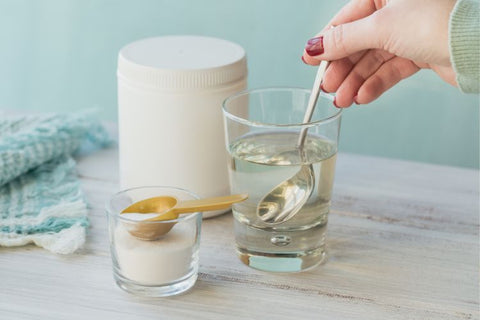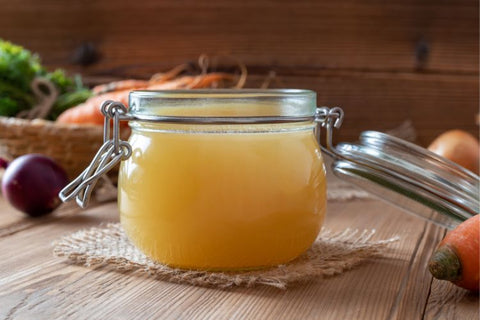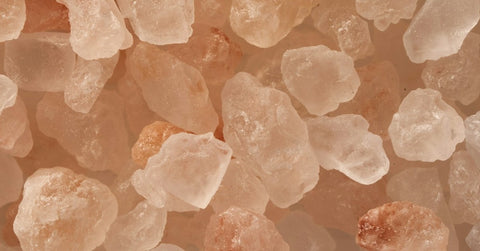The quest for optimal health and wellness has sparked a surge in interest in nutritional supplements like bone broth powder and collagen powder. As individuals seek natural ways to support joint health, skin elasticity, and overall vitality, these two supplements have emerged as popular choices. In this article, we delve into the debate: Which is better—bone broth powder or collagen powder? By exploring their sources, nutritional content, versatility, and health benefits, we aim to provide clarity on the merits of each, empowering readers to make informed decisions about their supplementation choices.
Source of Nutrients
Bone broth powders have surged in popularity in recent years, touted for their potential health benefits. But where do these powders originate, and what nutrients do they offer? Let's delve into the creation of bone broth powder and explore its nutrient profile, including the ever-important collagen.
From Simmering Stock to Powdered Convenience
Bone broth powder is derived from a traditional practice of simmering animal bones, tendons, and ligaments in water for an extended period. This lengthy cooking process extracts various nutrients from the connective tissues, including:
- Collagen: This abundant protein provides structure and support to joints, skin, and connective tissues.
- Gelatin: When collagen breaks down during cooking, it forms gelatin, which contributes to the broth's texture and may have gut health benefits.
- Minerals: Depending on the source and processing methods, bone broth powder may contain minerals like calcium, magnesium, phosphorus, and potassium.
Collagen Powerhouses: Where Does Collagen in Powders Come From?
Collagen is the star player in bone broth powder, but it can also be found in other collagen powder supplements. Here are some of the common sources used to extract collagen for these supplements:
- Beef Bones: Cow bones, particularly from knuckles and feet, are a popular source of collagen for powders. These bones are rich in Type I collagen, which is abundant in skin, tendons, and ligaments.
- Chicken Cartilage: Chicken sternal cartilage, found near the breastbone, is another source of collagen for powders. It contains a good amount of Type II collagen, which is the primary type found in cartilage.
- Fish Bones: Fish skin and bones are a source of Type I collagen for some marine collagen powders. These powders may also contain beneficial compounds like chondroitin sulphate, which may support joint health.
- Pig Skin: Pig skin is a source of Type I collagen used in some collagen powders.
Collagen Concentration
Collagen is a hot topic in the world of health and wellness, and both bone broth powders and collagen powders claim to be rich sources. But when it comes to collagen concentration, which one reigns supreme? Let's delve into the differences in collagen content between these two popular supplements.
Here's a breakdown of the key points:
Collagen Concentration:
- Collagen Powders: Designed for concentrated collagen intake. They can range from 10 grams to 20 grams of collagen per serving (scoop).
- Bone Broth Powders: While they contain collagen, it's not their primary focus. The collagen content in bone broth powder typically varies from 2 to 10 grams per serving, depending on the brand and the specific part of the animal used.
Reasons for the Difference:
- Processing Methods: Collagen powders often undergo a more concentrated extraction process specifically designed to isolate and maximize collagen content. Bone broth powders, on the other hand, prioritize extracting a broader range of nutrients from the bones, including collagen, but not in such high quantities.
- Source Material: Some collagen powders might use sources like cartilage, which are particularly rich in specific collagen types. Bone broth powders, while using bones and connective tissues, might not always target the most collagen-dense parts.
Protein Content
Protein is another key player in both bone broth powder and collagen powder. But when it comes to overall protein content, which one packs a bigger punch? Let's explore the protein profiles of these supplements to help you make an informed choice.
- Focus of Powders: Bone broth powder aims to extract a broad range of nutrients from the bones and connective tissues used, including protein, collagen, minerals, and potentially gut-supporting compounds.
- Collagen Focus: Collagen powder, on the other hand, prioritizes concentrated collagen extraction. While it may contain some additional protein, its primary focus is maximizing collagen content.
Protein Content Breakdown:
- Bone Broth Powder: Protein content can vary depending on the brand and processing methods, but it generally falls in the range of 10-20 grams per serving.
- Collagen Powder: Protein content is usually lower than bone broth powder, typically ranging from 5-10 grams per serving. This is because the processing focuses on isolating collagen, not maximizing overall protein content.
Versatility
Collagen powder offers potential health benefits, but its taste can be a hurdle. Here's how to incorporate collagen powder into various foods and beverages without significantly affecting their flavour, alongside how bone broth powder's distinct flavour might influence recipes:
Collagen Powder
The beauty of collagen powder lies in its versatility. Here are some tips for incorporating it seamlessly into your diet:
- Beverages: Blend collagen powder into smoothies or protein shakes. The strong flavours of fruits, vegetables, and other ingredients can easily mask the taste of collagen. You can also mix it into coffee, tea, or juice for a subtle protein boost.
- Baked Goods: Collagen powder can be added to muffins, pancakes, waffles, or bread recipes. The baking process often masks any subtle collagen flavour, and the protein content gets a nice bump.
- Soups and Stews: Collagen powder blends well with savoury dishes like soups and stews. The additional protein can add a thickening effect and a slight richness without overpowering the overall flavour profile.
- Yogurt or Oatmeal: Stir collagen powder into plain yogurt or oatmeal for a protein-packed breakfast or snack. Toppings like fruits, nuts, or seeds can further diminish any collagen taste.
Bone Broth Powder
Bone broth powder has a distinct savoury flavour profile that can influence recipes in unique ways:
- Soups and Stews: This is where bone broth powder truly shines. It adds a deep, meaty flavour base to soups and stews, enhancing their richness and complexity.
- Sauces and Gravies: Bone broth powder can be used to thicken and add a savoury depth to sauces and gravies. It's a great way to add protein and flavour to your favourite dishes.
- Marinades: Marinating meats or vegetables in bone broth powder can infuse them with a subtle savoury flavour and potentially tenderize them.
Joint and Skin Health
Joint pain and wrinkles are two common concerns as we age. However certain dietary choices might offer support. Enter bone broth powder and collagen powder, both touted for their potential benefits for joints and skin.
Bone Broth Powder: A Multi-Nutrient Approach
Bone broth powder boasts a combination of nutrients that may contribute to joint and skin health:
- Collagen: Like collagen powder, bone broth powder contains collagen, a crucial protein that provides structure and support to joints and skin. While the concentration might be lower than in dedicated collagen powders, it still contributes to overall collagen intake.
- Glucosamine and Chondroitin (Potential): Some bone broth powders may contain glucosamine and chondroitin, compounds found in healthy cartilage. While research is ongoing, these compounds may offer some benefits for joint health.
- Minerals: Bone broth powder may contain minerals like calcium, magnesium, and phosphorus, which are essential for maintaining healthy bones and potentially reducing the risk of osteoporosis.
Collagen Powder: A Targeted Approach
Collagen powder focuses on delivering a concentrated dose of collagen, which offers specific benefits for joint and skin health:
- Building Blocks for Cartilage: Collagen is a major component of cartilage, the cushiony tissue that protects the ends of your bones and allows them to glide smoothly against each other. By providing the building blocks for collagen, collagen powder may help maintain healthy cartilage and potentially reduce joint discomfort.
- Skin Elasticity: Collagen is a key structural component of skin. As we age, collagen production naturally declines, leading to wrinkles and loss of elasticity. Consuming collagen peptides may stimulate collagen production in the skin, potentially leading to improved skin health and a reduction in wrinkles.
Amino Acid Profile
Collagen powder, despite being a protein source, doesn't have the same diverse amino acid profile as whey protein or other complete protein sources. However, it excels in specific amino acids crucial for collagen synthesis:
- Glycine: This is the most abundant amino acid in collagen, typically making up around one-third of its total amino acid content. Glycine plays a vital role in the formation of the triple-helix structure that gives collagen its strength and stability.
- Proline: Another major amino acid in collagen, constituting roughly 10-15% of its total content. Proline is unique because it has a ring-shaped structure that helps stabilize the collagen molecule and contributes to its flexibility.
- Hydroxyproline: This modified version of proline is almost exclusive to collagen and makes up around 10% of its amino acid content. Hydroxyproline formation requires vitamin C, and it further strengthens and stabilizes the collagen molecule.
Importance for Collagen Synthesis:
These three amino acids work together in the body to facilitate collagen synthesis:
- Building Blocks: Glycine and proline act as the primary building blocks for collagen molecules. The high concentration of these amino acids in collagen powder ensures a readily available supply for collagen synthesis.
- Stability and Strength: Hydroxyproline formation, requiring vitamin C, strengthens the collagen molecule and contributes to its unique triple-helix structure. Collagen powder indirectly supports this process by providing a good source of proline, the precursor to hydroxyproline.
Dietary Restrictions
Both collagen powder and bone broth powder can be suitable options for certain dietary restrictions. Here's a breakdown:
Collagen Powder: A Boon for Many Restrictions
Collagen powder generally shines for a variety of dietary restrictions due to its simple composition:
- Gluten-Free: Collagen itself is naturally gluten-free, making the powder a safe choice for individuals with celiac disease or gluten sensitivity.
- Dairy-Free: Collagen is typically derived from animal sources like cows, pigs, or fish. However, the processing removes most lactose, making collagen powder suitable for those with lactose intolerance or following a dairy-free diet. It's important to check the label to ensure the specific collagen powder you choose is free of any dairy traces.
- Paleo-Friendly: Collagen is a protein source derived from animals, aligning with the principles of a Paleo diet. However, some collagen powders might contain additional ingredients that may not be Paleo-compliant, so be sure to read the label carefully.
- Keto-Friendly: Collagen powder is generally very low in carbs and fat, making it a keto-friendly option. However, some collagen powders might have added sugars or flavours, so checking the label for net carbs is crucial.
Bone Broth Powder: Considerations for Restrictions
Bone broth powder can also be suitable for some dietary restrictions, but there are a few things to keep in mind:
- Gluten-Free: Bone broth powder itself is usually gluten-free. However, some brands might thicken their broths with grains containing gluten. Always check the label for gluten-free certification.
- Dairy-Free: While bone broth is typically made with animal bones, some brands might add dairy ingredients like milk or cream for flavour or thickening. Be sure to choose a dairy-free variety if you have lactose intolerance or follow a dairy-free diet.
- Paleo-Friendly: Bone broth powder aligns well with Paleo principles as it's derived from animal bones. However, some brands might add non-Paleo-compliant ingredients like grains or legumes for flavouring. Careful label reading is essential.
- Keto-Friendly: Bone broth powder can be keto-friendly due to its low carb and fat content. However, some brands might add sugars or thickeners that increase carbs. Checking the label for net carbs is necessary.
Digestibility
Both collagen powder and bone broth powder are generally considered easily digestible for most people. Here's a breakdown of their digestibility factors:
Collagen Powder: A Pre-Digested Protein Source
Collagen powder offers several advantages in terms of digestion:
- Breakdown Advantage: Collagen powder is already hydrolyzed collagen, meaning the collagen molecules have been broken down into smaller peptides. This pre-digested form allows for easier absorption by the small intestine.
- Limited Allergens: Collagen itself is a relatively simple protein with minimal allergenic potential. This makes it a good option for those with sensitivities to other protein sources like dairy or soy.
Bone Broth Powder: A Gentle Broth Option
Bone broth powder also boasts some digestive benefits:
- Simmering Advantage: The lengthy simmering process used to make bone broth breaks down some connective tissues and proteins in the bones, potentially making them easier to digest.
- Gelatin Content: Bone broth powder often contains gelatin, a protein derived from collagen that can soothe the digestive tract and promote gut health.
Taste Preferences
Collagen and bone broth powders have become popular additions to many diets. But beyond their potential health benefits, their taste profiles can significantly influence how you incorporate them into your meals.
Collagen powder often earns the label of "flavourless" for a few key reasons:
- Simple Composition: Collagen itself is a protein with a relatively simple molecular structure. Unlike other protein sources like whey protein, which has a broader range of amino acids contributing to taste, collagen lacks complex flavour profiles.
- Hydrolyzed State: Most collagen powders are hydrolyzed, meaning the collagen molecules are broken down into smaller peptides. This process further reduces any potential taste the collagen might have had.
The result? Collagen powder has a very neutral taste, making it easily incorporated into various foods and beverages without significantly altering their overall flavour.
In contrast to collagen powder, bone broth powder has a distinct savoury flavour profile for several reasons:
- Concentration of Flavorful Components: The simmering process used to create bone broth extracts various flavour compounds from the bones and connective tissues. These include amino acids, peptides, and roasted flavour notes, all contributing to the savoury taste.
- Minerals and Other Compounds: Bone broth powder also contains minerals like sodium and potassium, which can influence the overall taste profile and add a slightly salty or brothy flavour.
Conclusion
In the realm of nutritional supplements, both bone broth powder and collagen powder offer distinct advantages. Bone broth powder provides a comprehensive nutrient profile beyond collagen, potentially benefiting joint health with added minerals and compounds like gelatin. On the other hand, collagen powder focuses on delivering a concentrated dose of collagen, ideal for supporting skin elasticity and joint function. Ultimately, the choice between these two supplements depends on your specific health priorities and dietary preferences. By understanding their differences in sources, nutrient content, and applications, you can select the supplement that best supports your wellness journey.





